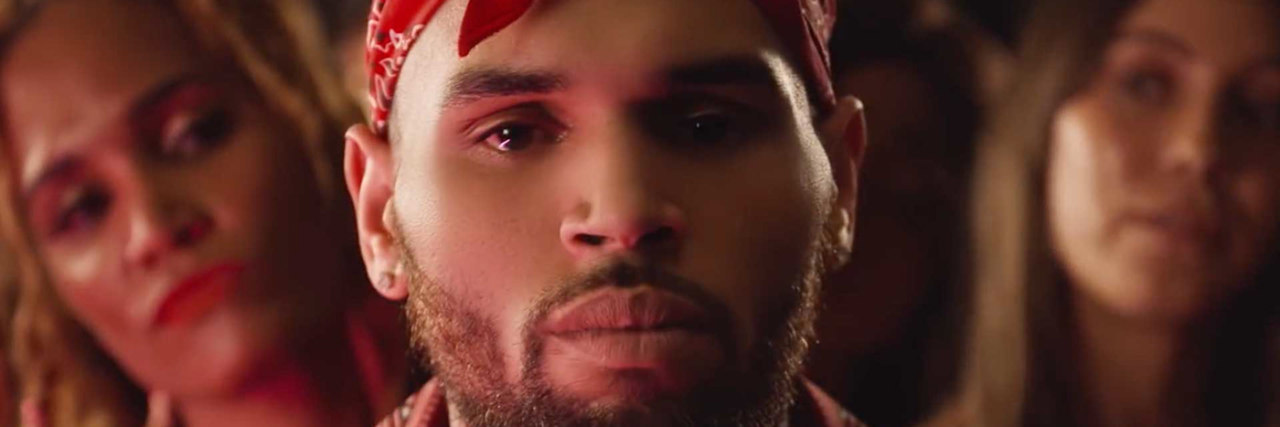Sometimes the news isn’t as straightforward as it’s made to seem. Juliette Virzi, The Mighty’s Associate Mental Health Editor, explains what to keep in mind if you see this topic or similar stories in your newsfeed. This is The Mighty Takeaway.
On Saturday, Chris Brown shared a message on Instagram to his fans who are struggling with suicidal ideation. The singer, who was diagnosed with bipolar disorder and PTSD in 2014, posted a photo that said, “To any suicidal followers I may have: this is a sign to not kill yourself. You are loved and the world is special because you are in. Keep holding on.”
View this post on Instagram
Fans commented on the post, tagged friends, shared their own experience with suicidal thoughts and reblogged his post. And while I’m all for celebrities advocating for suicide prevention, I’ll admit, my feelings about his post were mixed.
On one hand, by looking at the comments, it’s easy to see that Brown’s message did indeed help people. But on the other hand, it looks a lot like another effort to redeem the controversial rapper’s ruined career — particularly in light of the problematic way he’s spoken about suicide in the past.
In March of last year, when rumors circulated that singer Kehlani Parrish cheated on then-boyfriend NBA player Kyrie Irving, Parrish shared a photo on Instagram of her arm hooked up to an IV, with a caption that indicated she had attempted suicide in wake of the rumors. Brown, who is friends with Irving, took to Twitter to accuse Parrish of seeking attention. He tweeted, “There is no attempting suicide. Stop flexing for the gram. Doing shit for sympathy so them comments under your pics don’t look so bad.”
There is no attempting suicide. Stop flexing for the gram. Doing shit for sympathy so them comments under your pics don’t look so bad
— Chris Brown (@chrisbrown) March 30, 2016
In addition to his ignorant statement about the “nonexistence” of attempting suicide, there is also the issue of Brown’s history of violence towards women, beginning in 2009 with the highly-publicized assault of Rihanna, up until last year when Brown was accused of punching a woman in the face at a Las Vegas nightclub.
In his documentary, “Welcome to My Life,” which was released this August, Brown discussed the altercation with Rihanna, claiming he was driven to violence that night because the relationship had grown increasingly violent on both sides. (Because of the potentially triggering nature of these comments for survivors of domestic violence, we haven’t quoted them in this article, but you can read a selection of them here.) Though Brown issued a formal apology via YouTube in 2009 for his actions, the comments in his new documentary were regarded by many as deflecting the blame onto Rihanna.
In an interview with Harper’s Bazaar, Sandra Horley, CEO of Refuge, one of the UK’s largest domestic violence prevention nonprofits, said,
Whatever goes wrong in a relationship, no man has a right to hit his partner. We all say and do things we later regret, but domestic violence does not “take two.” No woman can make a man hit her; violence is a choice he makes and he alone is responsible for it. Blaming the victim is another way perpetrators maintain control over their victims – it shifts the responsibility to the woman. Manipulating her into thinking she is responsible is a ploy abusers use to deflect from their violent and controlling behavior. Hitting a woman is never acceptable behavior – it is against the law.
So yes, Brown did a good thing when he posted about suicide prevention, but is it enough to redeem a someone who can’t seem to take ownership of their past actions?
Though Brown’s post about suicide prevention seems to have nothing to do with his treatment of women, the seemingly constructive messages he posts will continue to be tainted until he takes full ownership of past wrongdoings. How are we supposed to believe Brown cares about people struggling with suicidal thoughts when he has still never apologized to Parrish for implying she posted about her own suicide attempt for attention? How are people struggling with suicidal thoughts supposed to trust the words of a man who has victimized and blamed women for his brutal treatment of them?
We don’t need our celebrity mental health advocates to be perfect, but we do need them to honor and value the same ideals they communicate.
Chris Brown, we want to believe that you care for the well-being of others — particularly women — but we need you to prove it to us first. Skip the victim-blaming, suicide attempt shaming and own up to the things you’ve said and the things you’ve done. Your message of suicide prevention won’t carry the weight it deserves until you do.
If you or someone you know needs help, visit our suicide prevention resources page.
If you need support right now, call the National Suicide Prevention Lifeline at 1-800-273-8255 or text “START” to 741-741.
If you or a loved one is affected by domestic violence or emotional abuse and need help, call The National Domestic Violence Hotline at 1-800-799-7233.
Lead photo via Chris Brown Facebook page and Screenshot via Instagram
Image via Creative Commons/Joshua Reis

